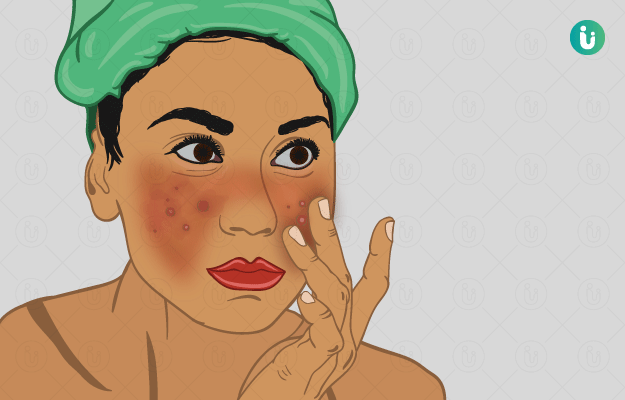What is Rosacea?
Rosacea or acne rosacea is a type of skin condition that typically affects the facial skin. The capillaries enlarge to give a permanent flush to the face. Likewise, forehead, cheeks and chin manifest yellow pimples in a manner similar to acne. In some instances, it may be mistaken for acne; however, it is important to mention that rosacea doesn't leave a scar the way acne do.
This condition occurs usually between females of the age group of 30-50 years and gives an appearance of flushed skin. The permanent redness aggravates with the progression of the condition as the capillaries enlarge. In men, the condition also brings redness to the nose.
What are its main associated signs and symptoms?
The condition is identified with the redness or frequent flushing on the face. In some instances, the eyes get affected and become bloodshot and gritty. Other symptoms include:
- Redness on the forehead, cheeks and chin.
- Flushing.
- Bumps and pus-filled pimples.
- Visible blood vessels in fair-skinned females.
- Rough and uneven skin tone.
- Rhinophyma or thickening of the nose skin.
- Burning sensation on the face.
- Spots on the face.
What are its main causes?
The condition may be the outcome of mites that are commonly found on the face. The other triggers that may cause the condition include:
- Abnormalities of the blood vessels.
- Caffeinated or hot drinks like tea and soup.
- Exposure to UV rays.
- Stress.
- Red wine or alcoholic drinks.
- Temperature extremes.
- Intense exercise.
- Medications.
How is it diagnosed and treated?
Rosacea can be diagnosed by physical examination and taking a detailed medical history. Blood tests may rule out similar conditions like lupus erythematosus. Hence, a visit to the doctor may also help identify the underlying cause of the condition.
However, it is common for an average person to confuse the symptoms of the condition with those of acne, seborrheic dermatitis and perioral dermatitis.
Treatment of the condition includes:
- Avoiding the underlying triggers.
- Regular cleansing of the face.
- Application of sunscreen lotion.
- Phototherapy.
- Antibiotics like doxycycline or minocycline.
- Topical treatment with creams and lotions.
- Diathermy.
- Laser treatment.
- Isotretinoin administration.
- Surgery.

 OTC Medicines for Rosacea
OTC Medicines for Rosacea
 Rosacea articles
Rosacea articles

 Home Remedies for Rosacea
Home Remedies for Rosacea



 Editorial Team
Editorial Team











